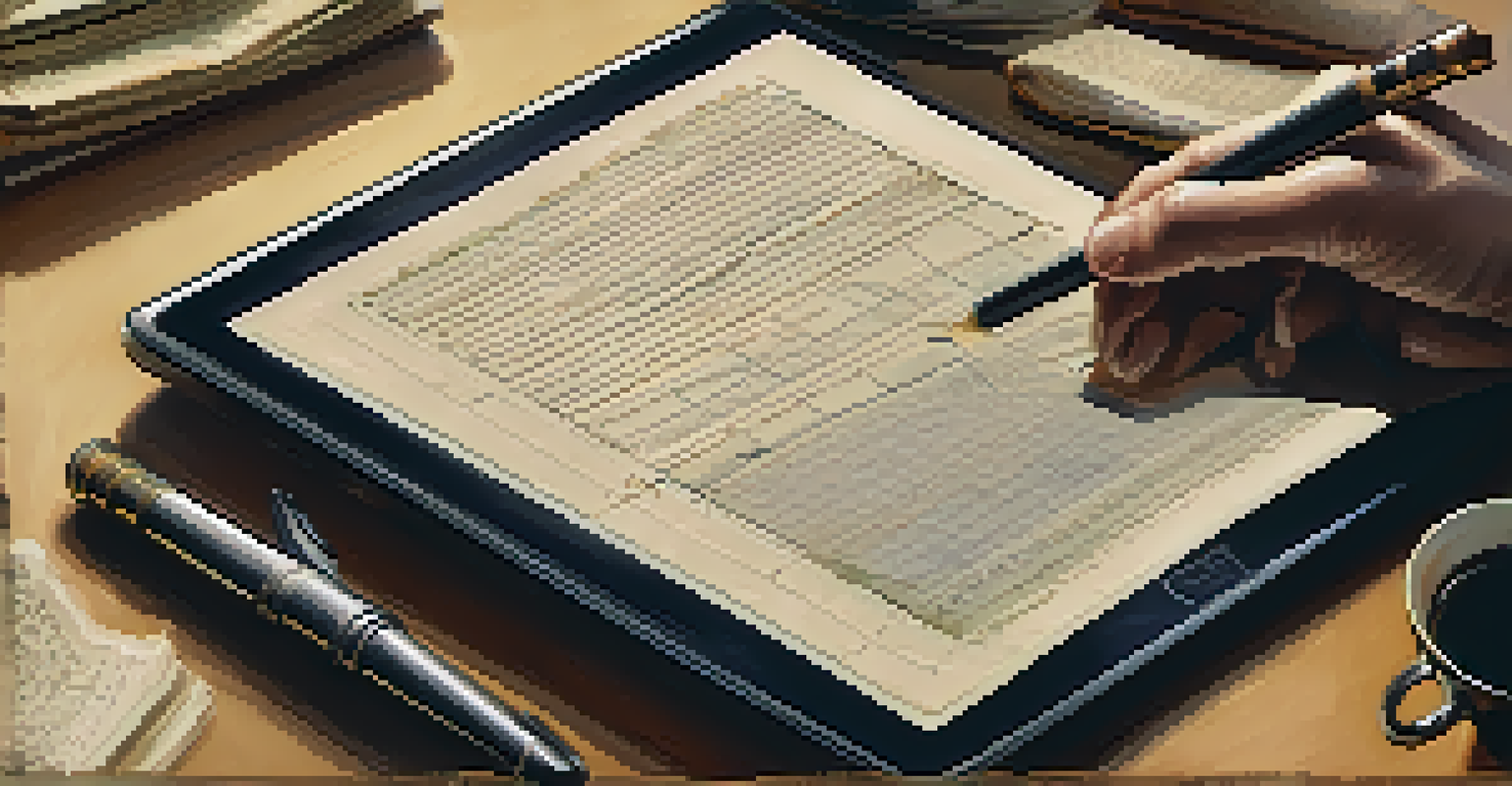Using Digital Archives for Historical Research

Introduction to Digital Archives and Their Importance
Digital archives are collections of historical documents and records that have been digitized and made accessible online. They serve as a vital resource for historians, researchers, and anyone interested in the past. By converting physical materials into digital formats, these archives allow users to explore vast amounts of information from anywhere in the world.
Digital archives are the key to preserving our history for future generations, providing access to resources that were once hidden away.
The importance of digital archives cannot be overstated. They not only preserve historical documents but also make them easier to search and analyze. This shift to digital formats has democratized access to history, enabling a broader audience to engage with research that was once limited to libraries and specialized institutions.
Additionally, digital archives often include multimedia elements like photographs, videos, and audio recordings, enriching the research experience. For example, a historian studying a particular event can find not just written accounts but also visual and auditory records that provide deeper context.
Finding Reliable Digital Archives
When diving into digital archives, the first step is locating reliable sources. Many universities, libraries, and government institutions have dedicated digital collections accessible to the public. Websites like the Library of Congress or Europeana are great starting points for credible historical documents.

However, not all digital archives are created equal. It’s crucial to evaluate the authenticity and reliability of the sources you use. Look for archives that provide clear citations and context for their materials, as these factors contribute to their overall credibility.
Digital Archives Enhance Access
Digital archives make historical documents widely accessible, allowing users to explore vast information from anywhere.
Once you’ve identified trustworthy archives, take the time to familiarize yourself with their search functions and organizational structures. This knowledge will save you time and lead to more effective research as you navigate through the digital landscape.
Utilizing Search Functions Effectively
Many digital archives come equipped with advanced search functions, making it easier to sift through vast amounts of data. Utilizing keywords, filters, and tags can significantly enhance your search results. For instance, if you’re researching a specific historical figure, using their name along with relevant dates or events can yield more precise results.
The past is never dead. It's not even past.
Additionally, understanding Boolean operators (like AND, OR, NOT) can refine your searches even further. For example, searching for 'Civil War AND letters' can help you find documents that specifically discuss letters written during that period, filtering out less relevant materials.
Don't hesitate to explore the archive's help section or user guides. These resources often provide tips on optimizing your search strategies and can help you uncover hidden gems within the collection.
Analyzing and Interpreting Digital Materials
Once you've gathered materials from digital archives, the next step is analysis. This involves not just reading the documents but also understanding their context and significance. Consider the time period, the author's background, and the intended audience to gain a well-rounded perspective.
It’s often helpful to compare multiple sources to identify patterns or discrepancies. For instance, if two historical accounts differ on a specific event, examining the context behind each source can illuminate biases or perspectives that shaped their narratives.
Challenges in Digital Research
Despite their benefits, digital archives can present challenges, such as biased representations and unequal access to technology.
Taking detailed notes during your analysis can also be beneficial. Jot down your thoughts, questions, and connections to other research, as this will aid in developing a comprehensive understanding of the materials.
Preserving Digital Findings for Future Research
As you conduct your historical research, it’s essential to preserve your findings for future reference. Creating a digital archive of your own can be incredibly useful, especially if you’re working on a long-term project. Consider organizing your findings by themes, dates, or subjects for easy access later.
Using citation management tools can help keep track of sources and references efficiently. These tools allow you to collect, organize, and format citations, ensuring that your work adheres to academic standards and can be easily revisited.
Lastly, sharing your findings with others, whether through blogs, presentations, or academic papers, contributes to the broader conversation about history. By making your research accessible, you invite feedback and collaboration, enriching the field of historical study.
Challenges of Digital Archives in Historical Research
While digital archives offer incredible opportunities, they also come with challenges. One significant issue is the risk of incomplete or biased representations of history. Digitizing materials can sometimes lead to the omission of vital documents or perspectives, creating a skewed understanding of the past.
Moreover, the technology used to create and maintain digital archives can be a barrier. Not everyone has equal access to the internet or the skills to navigate complex digital environments, which can limit participation in historical research.
Future of Digital Archives is Bright
Advances in technology promise to improve how we access and analyze historical materials, expanding the richness of historical narratives.
Researchers must remain aware of these challenges and strive for a balanced approach. This might include consulting traditional archives or engaging with community historians to ensure a more comprehensive narrative is explored.
The Future of Digital Archives in Historical Research
Looking ahead, the future of digital archives in historical research is bright. Advances in technology, such as artificial intelligence and machine learning, are enhancing how we access and analyze historical materials. These tools can help identify patterns, categorize documents, and even transcribe handwritten materials more efficiently.
Furthermore, as more institutions recognize the importance of digitization, we can expect an expansion in the availability of online resources. This democratization of access allows for diverse voices and perspectives to be included in historical narratives, enriching our understanding of the past.

Ultimately, embracing these technological advancements while remaining critical of their limitations will shape the way we conduct historical research. The continued collaboration between historians, technologists, and the public will ensure that digital archives remain a cornerstone of historical inquiry.